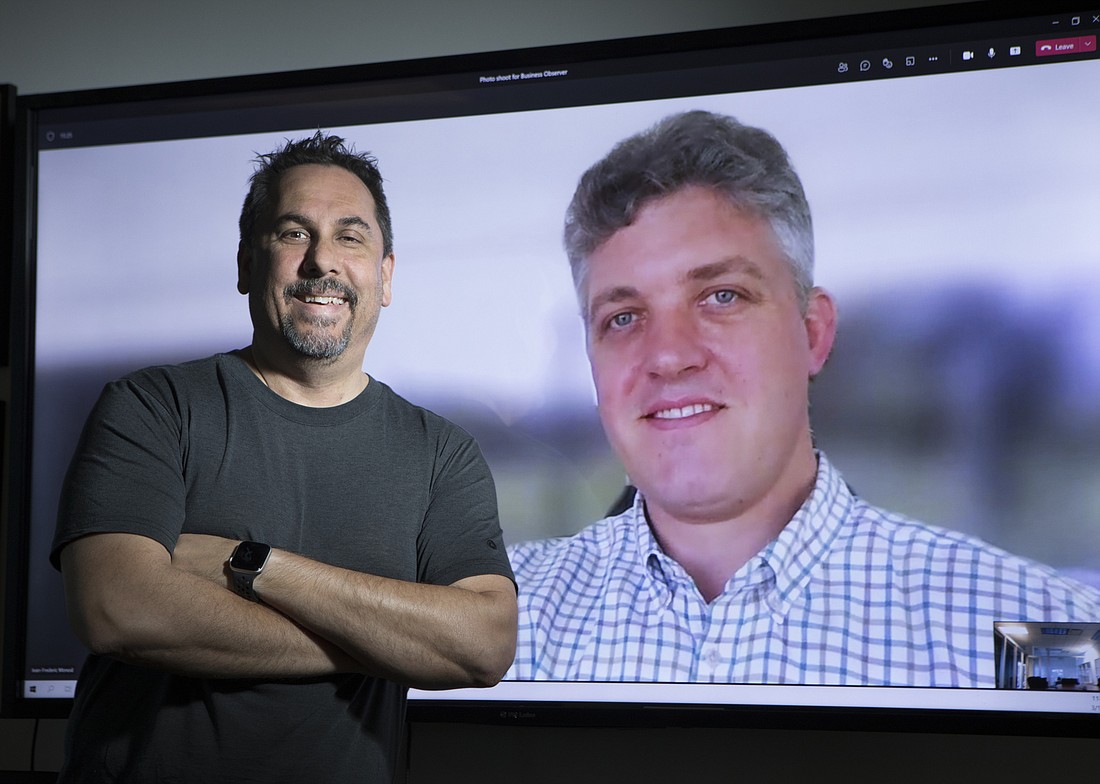- April 3, 2025
-
-
Loading

Carbon Design & Architecture principals Sean Williams and Jean-Frederic Monod thought they had the next big thing on their hands when they created Digital Punch, a virtual reality program that allows developers and builders to see and fix project design flaws before a single shovelful of dirt is moved. It was meant to make punch lists — documents that detail work that doesn’t confirm to design specifications and must be fixed before final payment is rendered — a thing of the past.
“We tried to sell it, to get it out there on the market,” Williams says. “Nobody wanted to pay for it, so we said, ‘Fine, we’ll turn it into a tool for designers and make better buildings with it.’”
Williams and Monod even tried to trademark the name Digital Punch, but their application was rejected. “It was too generic,” Williams says.
"We moved to St. Pete because it’s where talent and opportunities are. We're in the middle of everything. It's the city that everybody talks about." — Carbon Architecture & Design principal Sean Williams
It was time to try, try again, as the old saying goes. It was also time for a fresh start for Carbon, which relocated from Sarasota to St. Petersburg in January, just in time to celebrate 10 years in business.
“We moved to St. Pete because it’s where talent and opportunities are,” Williams says. “We're in the middle of everything. It's the city that everybody talks about; it has that cool factor … it offers a lot opportunity for the business development side.”
So how did Carbon rebound from Digital Punch being rebuffed? It doubled down on technology, using a structural mapping program called Nubigon that allows the firm to create incredibly detailed, 3D renderings of buildings for which it’s been hired to create renovation and/or expansion plans.
Monod, Carbon’s resident “tech guy,” uses a special camera that can capture 360-degree laser scans of a property. The data is then uploaded into Nubigon, which creates a 3D rendering, known as a point cloud, that consists of billions of dots, akin to a pointillist painting. It slashes what used to be a days-long process into a matter of hours.
“It's the only reason we can do so many diverse projects and still be competitive,” Monod says.
That diversity has been key to Carbon’s success during the pandemic. It has worked on projects ranging from church sanctuaries, health care facilities and law offices to liquor stores, RV parks, medical marijuana dispensaries and the Sarasota County Justice Center.
“It’s client-driven and relationship-driven,” says Rachel Ebner, Carbon’s recently hired director of development, in regard to the company’s eclectic portfolio. “That’s what any business wants.”
A particularly challenging project was the conversion of O2B Kids, an education and child care facility in Gainesville, into a training lab affiliated with North Florida Regional Hospital, which bought the 35,000-square-foot facility.
“We went in and scanned it so we could capture the whole space and show the client everything they’re going to have to deal with,” Williams says. “We showed them that they couldn’t afford to do it for what they thought they could, which was around $300,000. They were off by a factor of 10. It would take about $3 million [to do the conversion]. So it helped them understand that they were way off budget.”
The scanning process took less than a day, because it had to.
“The only available time was on a Sunday, because the rest of the time, there are 200 toddlers running around in there,” Monod says. “So I’m walking around with a laser scanner while Sean is walking around with a 360-degree camera. What you wind up with is a point cloud, because the scanner shoots 300,000 dots per second. It does what’s called simultaneous location mapping. It’s essentially the same technology the rovers on Mars use to figure out where they’re going.”
Next up for Carbon is 1700 Burlington, a 32-unit multifamily housing development in downtown St. Pete with 320-square-foot residences made from 40-foot shipping containers. The project, originally under the purview of Path Communities, has proceeded in fits and starts and was supposed to qualify as workforce and affordable housing, but has since shifted to market-rate status.
Path Communities sold 1700 Burlington to Stress Free Construction LLC, a Tampa developer that’s in the process of obtaining permits for the project.
“We’ve gotten through all the reviews,” Williams says. “We were supposed to start construction in November, but it got pushed back because the developers decided to sell.”